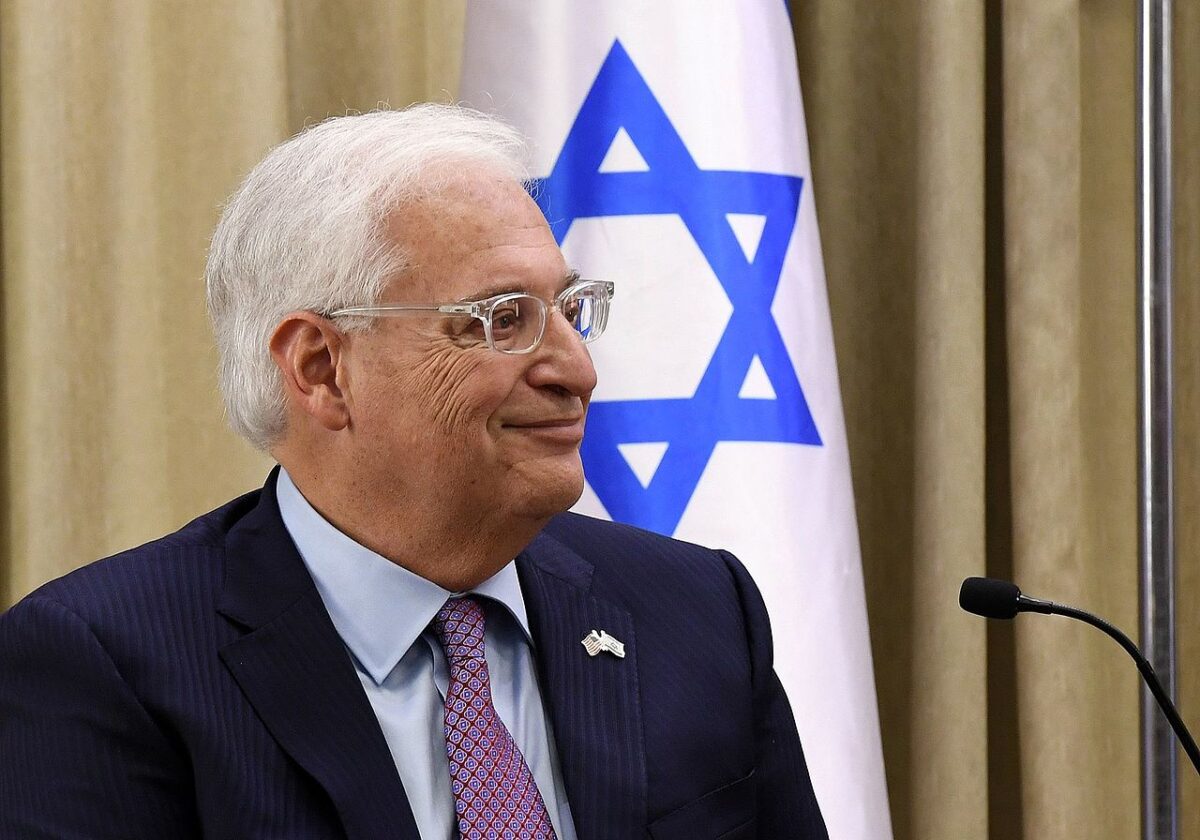David Friedman, the U.S. ambassador to Israel from 2017 to 2021, is a true believer.
A committed Orthodox Jew, he fervently believed that U.S. policy toward Israel was insufficiently supportive. A hardliner, he thought that Israel was entitled to build settlements in the West Bank, annex parts of it, and block the creation of an independent Palestinian state.
An ideologue, Friedman lacked a balanced or nuanced approach to Israel’s conflict with the Palestinians. Normally, he could not have aspired to such a sensitive post in U.S. diplomacy. But because he had Donald Trump’s full confidence and trust, he was given the job by the then U.S. president.
Formerly Trump’s bankruptcy lawyer, Friedman never once deviated from his unwavering beliefs. An energetic activist, he played an indispensable role in the Trump administration’s unilateral decisions to recognize Jerusalem as Israel’s capital, move the U.S. embassy from Tel Aviv to Jerusalem, and recognize Israel’s sovereignty over the Golan Heights.
And he was deeply involved in the formation of the 2020 Abraham Accords, which enabled Israel to normalize relations with four Arab countries — the United Arab Emirates, Bahrain, Morocco and Sudan — in just a matter of months.
With Trump’s defeat in the presidential election, Friedman resigned. A year on, he has published his memoirs, Sledgehammer: How Breaking With The Past Brought Peace To The Middle East (Broadside Books).
The title is somewhat misleading, given Israel’s shadow war with Iran, Israel’s persistent conflict with the Palestinians in general and with Hamas in particular, Israel’s tense relations with several of its neighbors, notably Syria and Lebanon, and Israel’s periodic skirmishes with Hezbollah. Yet the Abraham Accords have been successful, notwithstanding Sudan’s problematical place in them.
During his tenure in Israel, Friedman was like a bull in a china shop. “The prophets suggested a less-than-delicate approach to peacemaking might be necessary, something requiring more than a scalpel or a file,” he writes. “Perhaps even a sledgehammer.”
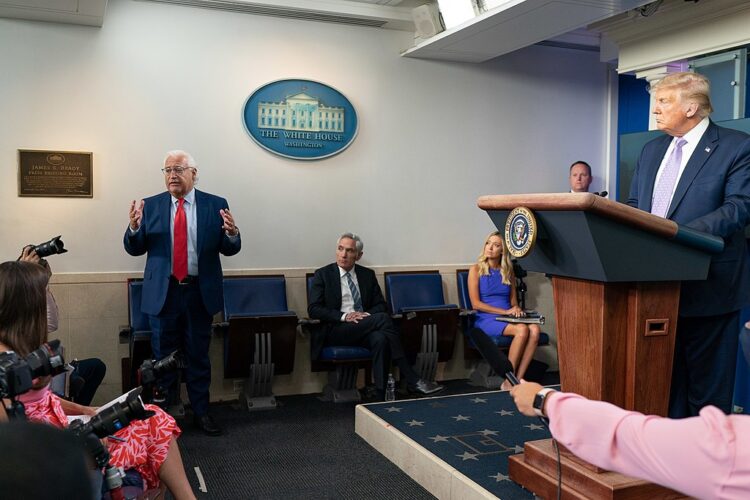
Friedman claims that U.S. policy with respect to Israel was “fundamentally broken and devoid of trust.” As he puts it, “It was broken in its failure to recognize the existential risks confronting this tiny nation. It was broken in its ignorance of the deep-held beliefs of so many Israeli people regarding the sanctity of their biblical homeland. It was broken in its failure to comprehend the strategic interests that Israel serves … It was broken in its wooden and outdated interpretation of international law. It was broken in its misreading of all the signals with regard to how to advance peace.”
In short, U.S. policy was “simply beyond repair.”
“I had a very different view of diplomacy,” he adds. “I had no interest in spending taxpayer money repeating failed strategies. Like a broken bone that had set without proper treatment, U.S.-Israel policy could be fixed only by breaking it and allowing it to set properly. It required nothing less than that proverbial sledgehammer to get this right.”
The sledgehammer strategy, he contends, brought “an explosion of peace.”
Having made these arguable claims, Friedman goes back to the basics of his relationship with Trump, whom he met in 2004 in a discussion about his casinos in New Jersey. “He was funny, smart and strategic,” he says of Trump. “I always saw in Donald the potential for great things.”
Friedman considers Trump his friend, but this does “not mean that I approve of everything he does.” For example, he urged Trump to accept the election results that ended his one-term presidency and focus on his achievements in office.
Trump understood that Israel is very important to Friedman’s identity after Friedman told him he intended to build a home in central Jerusalem. His emotional and intellectual affinity with Israel was forged on his first trip to the country in 1971 at the age of 13. Friedman’s father, a rabbi, was also influential in his thinking.

Plainly, Friedman is a hawk. As president of the American Friends of Bet-El Yeshiva Center, he was wholly in favor of Israel’s settlement project in the West Bank, which he prefers to call Judea and Samaria. “It is disputed territory,” he says. “It is not, as almost the entire world maintains, illegally occupied territory.”
Friedman believes that the West Bank is the “biblical heartland of the Jewish people,” and that Israel has the “best claim” to it. Further, he warns that Israel’s relinquishment of it in exchange for a promise of peace “would lead to catastrophic results.”
At best, he supports Palestinian autonomy rather than statehood in selected areas of the West Bank. He cites the late Yitzhak Rabin’s endorsement of “less than a state” for the Palestinians to strengthen his argument.
“The Palestinians have done nothing to assure Israel … that they have the capability of living side by side in peace in an independent state,” he says incorrectly. “Indeed, just the opposite is true … Insisting upon a two-state solution is to insist on no solution.”
Friedman, an opponent of the 1993 Oslo accord, joined Trump’s presidential campaign in 2016, when he offered to help him on issues relating to Israel and its neighbors. Trump agreed. He and Trump’s general counsel, Jason Greenblatt, worked in tandem on these matters.
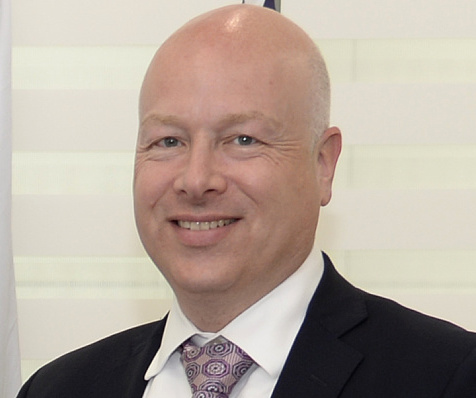
Around this time, he compared J Street, a liberal pro-Israel organization, to kapos in Nazi concentration camps. In retrospect, he regrets the terminology. It was a “dumb mistake,” he admits.
Candidly enough, he faults Trump’s approach to Israel during his campaign as “inconsistent” and even “confusing.” Friedman and Greenblatt were instrumental in drawing up a set of strong pro-Israel policies that were incorporated into the Republican Party’s official platform.
In the wake of Trump’s unexpected victory over Hillary Clinton, Friedman asked the president-elect to appoint him as ambassador to Israel. Friedman’s appointment did not go down well in the State Department. Secretary of State Rex Tillerson was dismissive of him. “He’s not my ambassador,” Tillerson declared.
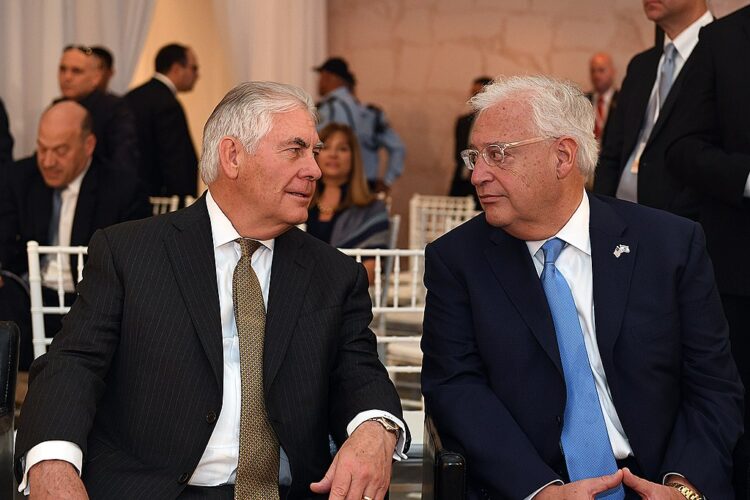
From the moment Friedman arrived in Israel, he was determined to upend the status quo.
He castigated the U.S. consulate in Jerusalem as an “anachronism, an irritant, and an unguided missile.” It was nothing less than a de facto mission to the Palestinians in the West Bank and Gaza Strip, he argues. “It was a terrible idea,” a “thorn in the side” of the U.S. embassy in Tel Aviv. In his opinion, the consulate should be in Ramallah, the seat of the Palestinian Authority.
Friedman’s unabashed stance toward Israel upset the old guard in the State Department. “Word of my stubborn insistence on standing with our ally Israel” prompted a U.S. official to offer him the following advice: “Mr. Ambassador, don’t be so Jewish. You represent the United States of America. Tone down the Judaism in your work.”
Friedman was furious but undeterred.
Having heard that one of Trump’s supporters had convinced him that Palestinian Authority President Mahmoud Abbas was more amenable to making peace than Benjamin Netanyahu, Friedman warned Israel’s prime minister that he should prepare a short video of Abbas’ alleged antipathy to peace. During his first visit to Israel, Trump watched the doctored tape with growing dismay. When he met Abbas, he demanded to know whether he was a peacemaker or a terrorist.
As Friedman acknowledges, Tillerson and Trump’s national security advisor, H.R. McMaster, were furious they had not been given advance notice of the video.
Friedman advised Trump to announce his recognition of Jerusalem as Israel’s capital before the U.S. embassy was actually moved out of Tel Aviv. Friedman prepared a memo outlining his reasons for transferring it to Israel’s capital, but Tillerson fought hard to delay the move. Friedman finally convinced Trump to fulfill his election promise, prompting Trump to say, “Let’s do it.”
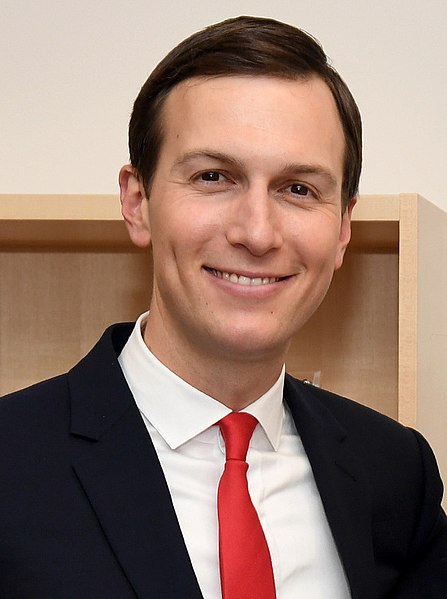
Turning to another topic, Friedman discloses that Trump’s Israel-Palestinian peace proposal, the so-called “deal of the century,” was the brainchild of Jared Kushner, his senior advisor and son-in-law. “Jared saw a real desire among Gulf states to be further aligned with Israel, but they needed something that would give them diplomatic and political cover,” he says. “We hypothesized that a ‘reasonable’ peace plan might provide that cover, even if the Palestinians opposed it.”
And so the Vision for Peace was hatched.
Friedman talked Trump into believing that a one-sided peace plan favoring Israel at the expense of the Palestinians could fly. But when Kushner learned that Netanyahu intended to annex the Jordan Valley following the unveiling of the Vision for Peace at a ceremony in Washington, he balked.
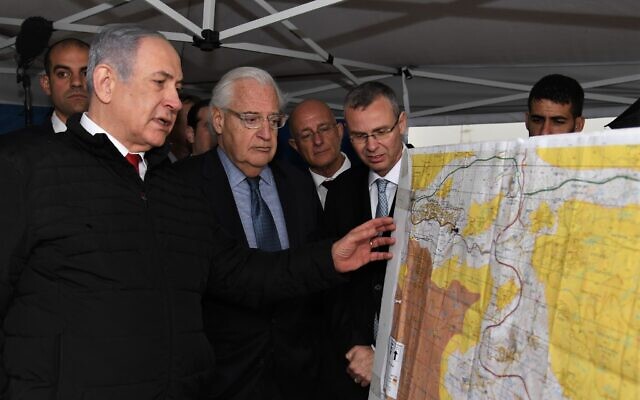
In the end, the Palestinians rejected the Vison for Peace and Trump ultimately withdrew his endorsement of annexation. Kushner told Friedman he “might be getting ahead of where the president was willing to go.”
Once the United Arab Emirates informed the United States it was willing to sign a normalization agreement with Israel in return for cancelling annexation, it was shelved. “Jared clearly thought peace with the United Arab Emirates was a much bigger prize than sovereignty, and I couldn’t disagree,” he says.
To Friedman, the status of the Golan Heights had to be settled as well. The Golan, captured by Israel from Syria in the Six Day War and annexed in 1981, was essential to Israel’s security. Friedman, therefore, was highly supportive of Netanyahu’s strategy to seek U.S. recognition of Israeli sovereignty over the Golan. He persuaded Trump to issue an announcement recognizing Israel’s conquest and annexation.
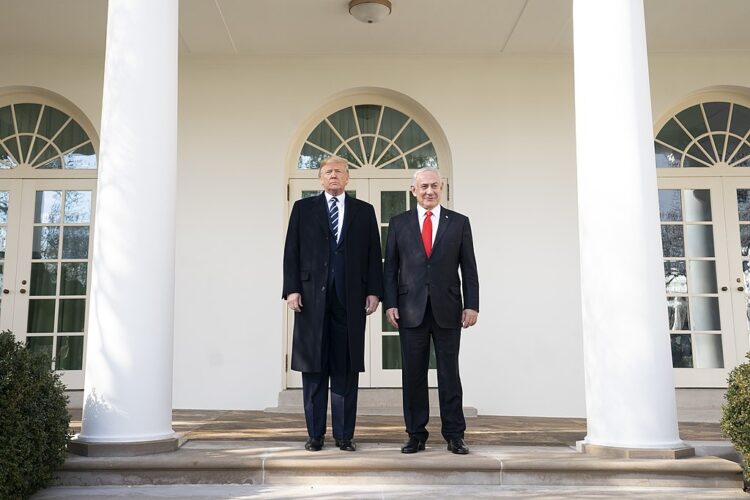
Toward the close of his ambassadorship, Friedman was instrumental in the passage of a few more pro-Israel initiatives, including a statement from U.S. Secretary of State Mike Pompeo, Tillerson’s successor, that Israeli settlements did not contravene international law.
In summing up, he writes, “I didn’t set out to be loved or hated or even influential. I set out to strengthen the relationship between the nation of my birth … and the nation of my faith and my history. I acted out of principle alone … that support for Israel is a quintessential American value.
“Accusations of ‘dual loyalty’ were directed at me from the beginning, often by my coreligionists. It saddened and surprised me but never deterred me. I always felt that I was serving America’s best interests … America needs Israel as a means of remaining tethered to its roots, its core values, and its basic freedoms.”
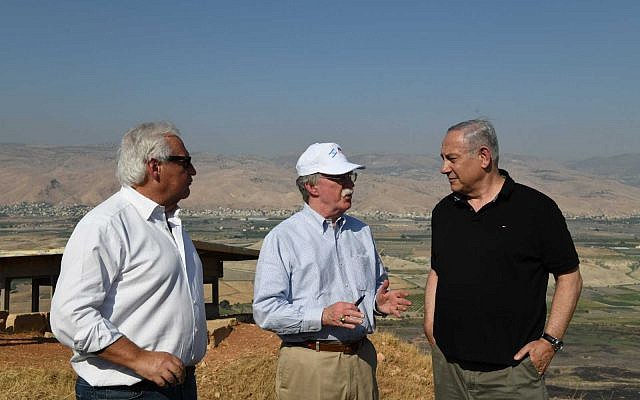
For better or worse, Friedman left an indelible impression as ambassador. Thanks in large part to him, the United States switched course — recognizing Jerusalem as Israel’s capital and moving its embassy there, recognizing the Golan as Israeli territory, and laying the groundwork for the Abraham Accords.
Trump’s successor, Joe Biden, has no intention of revoking these measures. Friedman can rest assured that his efforts have not been in vain.
